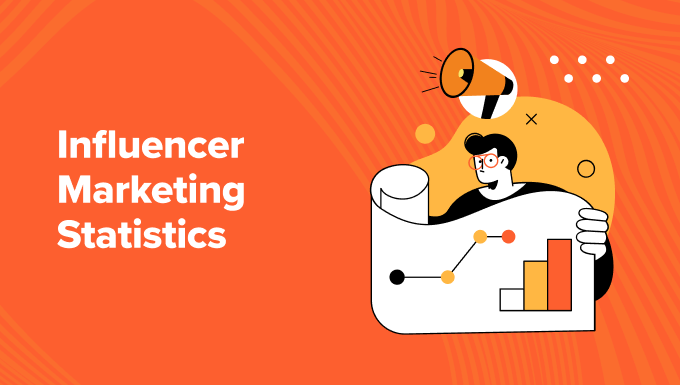Did you know that working with influencers can help you instantly connect with new audiences? This can be a very cost-effective way to grow your brand’s reach.
That being said, randomly contacting influencers isn’t likely to get you results. That’s why it’s a good idea to check out influencer marketing statistics first.
When you know how influencer marketing can impact consumer trust and engagement, you will be better equipped to make the right choices when hiring an influencer.
Alternatively, if you are a content creator looking for business partners, then you probably want to know how much to ask for and where to find the best opportunities.
Think of this article as your ultimate cheat sheet. We’ve packed over 60 statistics into this post that will help you better understand the impact and benefits of influencer partnerships.
So, let’s take a look at the most important influencer marketing statistics in 2025.

The State of Influencer Marketing – Statistics for 2025
We recommend reading our list of statistics from top to bottom so you don’t miss any important details. But, if you’re in a hurry and need to find a specific set of influencer statistics, then feel free to click the links below to get to the section you’d like to read:
- General Influencer Marketing Statistics
- Influencer Earning Statistics
- Social Media Influencer Marketing Statistics and Demographics
- Influencer Content and Engagement Statistics
- Benefits of Influencer Marketing Statistics for Businesses
- Influencer Marketing Cost Statistics
- Technology and the Future of Influencer Marketing
- Best Statistics, Trends, and Research Articles
General Influencer Marketing Statistics

- As of 2025, it’s estimated that the influencer marketing industry is worth $34.2 billion, and the market size is expected to grow over the next several years.
- In 2023, global influencer marketing spending reached $34.08 billion, with $26.09 billion in the United States alone.
- 83% of business owners who leverage influencer marketing say it has helped grow their companies.
- According to 60% of marketers, influencer posts perform better than traditional branded content.
- The top 5 countries for influencer marketing are the United States, Canada, the UK, Australia, and Germany.
- Here are the top 6 influencer niches: lifestyle, fashion, beauty, travel, model, and health and fitness.
- 39% of brand leaders say they have only worked with 10 influencers or less.
- On average, influencers respond to brand proposals within 14 hours.
- Influencer fraud is down, with less than 37% of accounts impacted. This is impressive when you consider that this number was 50% in 2021.
- 89% of marketers who used influencer marketing last year say they will maintain or boost their spending this year.
There’s no doubt that influencer marketing is growing in ways we never would have imagined 10+ years ago. As of right now, the industry is worth over $34.2 billion, and we don’t see things changing any time soon.
Business leaders and marketers will continue working with influencers because it helps them boost sales, engagement, and brand awareness. All three of these factors are very important for their long-term success.
On the other side of things, people are also discovering that they can grow an audience and get paid to promote their favorite products and services. While many people already make a living by being influencers, more content creators are entering the arena every day.
Now that you are starting to realize the impact of influencer marketing, let’s dive in and look at some earning statistics.
Influencer Earning Statistics

- Most influencers are compensated with money (41.6%), free products (29.5%), a steep in-store discount (17.7%), and giveaway entries (11.2%). This means paying influencers cash for their services is the top pick.
- However, close to 85% of influencers say they are happy to work for free products if they know and trust the brand or if the product is a high-ticket item.
- Most businesses do both: pay for influencer services and include the product they want the person to promote in the package.
- Micro-influencers with fewer than 10,000 followers charge between $20 and $100 for a post.
- Creators with a 10,000 to 50,000 follower count charge between $35 and $450 per post.
- Influencers with more than 50k but less than 500k followers charge $150 to $2,500.
- Macro influencers or mega influencers, meaning those with 500k to 1 million followers, charge between $250 and $7,000 for collaborations.
- Almost 75% of digital marketers have turned to affiliate marketing to boost their earnings.
- This makes sense when you consider over 80% of brands run affiliate programs.
- In total, 26% of influencers earn about $500 per month for their work.
- Meanwhile, 15% earn $5,000 or more each month through brand deals and content.
Influencers love what they do because they get cash payments, free products, and much more for working with partners in their niche. The statistics show that most businesses pay their partners for posts, which is great news for content creators.
However, it’s also worth noting that the majority of influencers are more than happy to accept a product as compensation if it’s from a brand they trust. That means that working on your social proof could help your business build better relationships with influencers.
It’s also worth noting the different types of influencers and how the rates can change. For instance, someone with less than 50,000 followers is almost always cheaper than someone with over 1 million followers.
If you are an influencer, we recommend calculating your price by looking at your efforts, audience size, and reach. You will meet people who will offer you much more and much less than the median numbers we listed above, so don’t get discouraged if you get a few low offers.
If you run your own website, then we recommend using a tool like MonsterInsights to track your website analytics. This will give you access to plenty of data, including your pageviews, visitors, and most popular content. Then, you can use this information to negotiate a better deal with businesses that you want to promote and endorse.
For more details, just see our guide on how to track website visitors in WordPress.
Related: See our original research on whether creators are telling the truth about how much money you can make on TikTok and YouTube.
Social Media Influencer Marketing Statistics and Demographics

- Globally, 5.04 billion people are social media users. That’s almost 60% of the population!
- The average person spends around 2 hours and 30 minutes on social platforms every day.
- 43% of people turn to social network sites when they are thinking of buying a product but don’t know where to start.
- 89% of marketers say Instagram is the best place to work with influencers.
- According to a HubSpot survey, 30% of respondents say that Instagram offers the highest influencer marketing ROI (return on investment).
- YouTube and TikTok are also extremely popular places to connect with influencers.
- There are over 100,000 self-described TikTok influencers in the United States. The majority of these influencers have between 50k and 100k followers.
- Instagram boasts an impressive 500,000 influencers, which is why it’s one of the most popular platforms.
- 77% of Instagram influencers who make money worldwide are women.
- On average, influencers use 2 or more social media marketing channels to build and maintain their reputations.
- Over 75% of all influencer marketers use social media engagement metrics to track their performance.
- Don’t be afraid to diversify your strategy. Omnichannel marketing generates 90% more engagement and customer retention than single-channel marketing.
Nearly 60% of the world has at least one social media account, and the average person spends over 2 hours a day on these sites.
Due to the popularity of these platforms, you would struggle to find influencers who don’t use social media to build and maintain their audiences.
Despite there being many influencer marketing platforms to choose from, three clear winners shine above the rest: Instagram, YouTube, and TikTok. These platforms have massive audiences, and most of them are willing to listen to influencers they trust and check out their product recommendations.
If you are an influencer with a website, then you probably want to know how to bring your site and social media together to maximize conversions. Luckily, the answer is easier than you might think.
You can easily harness the power of social media on your site with Smash Balloon. It is the best social feed plugin that works with all the popular social media platforms, including Facebook, TikTok, Instagram, and YouTube.
You can use Smash Balloon to embed your social feeds into your website and show visitors what’s happening on your social media accounts. This is a great way to transfer energy and excitement, which means a more engaged audience. Plus, you can allow people to follow and like your social content from your website, which can grow your audience.
Influencer Content and Engagement Statistics

- Almost 90% of consumers say they have engaged with an influencer at some point.
- 60% of online shoppers say they are more willing to trust an influencer if they regularly engage with comments on their content.
- 90% of shoppers say user-generated content (like influencer reviews) impacts their shopping habits.
- In the same group of shoppers, 61% say they trust reviews from reputable influencers just as much as a recommendation from friends and family.
- 32% of Gen Z claim they bought something they didn’t know existed because of an influencer recommendation.
- More than 40% of these people say they prefer watching reviews made by influencers they know and trust.
- 91% of people want to see more interactive content.
- Video content, like Instagram Stories and Reels, is a popular choice for influencers because the average person watches 100 minutes of content online every day.
- Nano influencers have a content engagement rate of 5%, which is significantly higher than the industry average of 2.2%.
- 98% of businesses will not reach out to an influencer if their content isn’t relevant to their target audience.
Influencer content comes in many different shapes and sizes. The most common format is video, but it’s not uncommon to see content creators use images, social media posts, and articles to promote partner brands.
When it comes to the type of content, reviews have the number one spot. Nearly 90% of people say reviews from influencers have a direct impact on how they shop. If someone’s favorite influencer tells them your product is the best, then there’s a good chance they will visit your website and make a purchase.
Reviews also act as social proof for business owners. People are more likely to think you’re trustworthy if people they trust say you are great. So, even if the customer isn’t ready to buy right this second, they will remember your company when making a purchasing decision in the future.
This works similarly to displaying testimonials on your website. So, we recommend using both strategies to get the most sales.
It’s also common for influencers to create a website where they can promote products and services.
Then, they could use a tool like OptinMonster to create a popup that invites users to join their email list in exchange for exclusive coupons that the subscriber can use on partner sites. This strategy helps influencers connect with their audience and allows them to understand which content resonates with their readers.
Benefits of Influencer Marketing Statistics for Businesses

- In 2023, 80% of online business owners who tried influencer marketing decided to dedicate a budget specifically to this strategy.
- This makes sense when you consider that influencer-generated content sees an engagement rate 8x higher than traditional social media posts.
- The top two reasons brands partner with influencers are that they want to expand their reach and generate more sales.
- Over half of all marketers say influencer partnerships have helped them find people who are genuinely interested in their products or services.
- 68% of marketers say they prefer working with influencers for brand collaborations.
- There are many ways to measure the success of your influencer campaigns. The three most common facts include views, reach, and impressions.
- 75% of businesses track influencer sales individually so that they can work with people who deliver the strongest ROI.
- According to HypeAuditor, brands will get $4.12 of earned media value for every $1 they spend on influencer marketing through Instagram.
- On average, successful businesses that use influencer marketers earn $5.78 in revenue for each dollar spent.
When we look a little deeper, it’s clear that there are plenty of benefits for brands that partner with influencers. A whopping 80% of leaders who have worked with at least one social media influencer said it was worth pursuing.
One main reason for this is that user-generated content, on average, sees 8x more engagement than normal posts and other branded content.
Businesses also have plenty of tools at their disposal to ensure they can find and keep the best influencers for their business. If you allow your influencers to also become affiliates, then we recommend keeping track of how everyone is doing with AffiliateWP.
AffiliateWP is the best self-hosted affiliate plugin that lets you set up your own affiliate program and track your affiliate partners. This allows you to see who is driving the most traffic and sales to your website. Once you know who your top performers are, you can prioritize them for new projects.
Influencer Marketing Cost Statistics

- Most companies spend less than $50,000 per year on influencer marketing, but about 11% have a budget of $500k or more.
- The average cost of working with an influencer is $257 per post, but that number can vary wildly based on audience size, industry, and reach.
- The average minimum price of a sponsored YouTube video with more than one million views was $2,500 in 2022. However, some YouTube influencers charge as high as $20,000 per post.
- On average, Snapchat influencers charge $10 per post per 1000 followers.
- About 61% of people work with the same influencers multiple times instead of constantly seeking new partners.
- The two most common challenges businesses face when choosing the right influencers are finding people with a similar audience and partnering with influencers who create high-quality content.
- 72% of businesses have an in-house influencer marketing strategy, as opposed to hiring a marketing agency to find partners and establish deals.
You may be shocked to learn that about 11% of businesses report spending over $500k on influencer deals. It’s safe to say that these companies are probably working with celebrity-level influencers. It’s not uncommon for people in this category to get paid $5,000 or more for a single post!
But don’t worry. The majority of marketers spend less than $50k a year to maintain influencer partnerships. This is partly because influencers and marketers prefer long-term arrangements.
Partnerships like this allow both sides to benefit. The influencers work with a company they are familiar with and may get access to new products in advance. Meanwhile, businesses and marketers can work with someone who genuinely understands their products and can connect with their target audience.
Technology and the Future of Influencer Marketing

- 63% of businesses say they use artificial intelligence (AI) to streamline their influencer marketing campaigns.
- The three main reasons for using AI and machine learning technology in this field include identifying influencers (64%), finding and distributing relevant content (13.3%), and identifying spammy influencers and fake engagement (5.6%)
- Over 50% of influencers think natural language processing (NLP) will make their jobs easier in the future.
- About 30% of influencers have invested in premium marketing software so they can manage and automate their campaigns.
- According to an Influencer Marketing Hub survey, over 60% of respondents said that they have used a virtual influencer, which is a software-created digital character that acts as an influencer.
- By the end of 2025, it’s estimated that brands will spend more than 50% of their marketing budgets on influencer marketing.
- Experts believe that the influencer industry will be worth an impressive $22.2 billion by the end of 2025.
- The market for influencer marketing software is predicted to grow by $223.7 million by the end of 2025.
Businesses and influencers are using AI and machine learning to make social media marketing easier. We expect to see both groups continue using these tools to do things like finding relevant partners, distributing content, and scheduling posts.
When it comes to the future of influencer marketing, things are looking bright. It’s estimated that the industry will be worth $22.2 billion by the end of 2025. Plus, the need for influencer marketing software is expected to grow by $223.7 million in just one year.
It doesn’t matter if you are an experienced influencer, thinking about entering the industry, or a business looking for influencer partners. There are more opportunities than ever before, and we expect the industry will keep growing in the future.
Sources
WPBeginner, AffiliateWP, TrustPulse, Smash Balloon, RafflePress, WPForms, OptinMonster, PushEngage, SeedProd, AIOSEO, InfluenceKit, Influencer Marketing Hub, Startup Bonsai, Goat Agency, Grin, Sprout Social, The Social Shepherd, HubSpot, Statista, Shopify, Collabstr, HypeAuditor, WebFX
We hope this list of influencer marketing statistics and trends helps you improve your strategy as a business owner or increase your sales as an influencer. You might also want to check out our other statistics articles:
Best Statistics, Trends, and Research Articles
- 60+ Affiliate Marketing Statistics You Need to Know
- Creator Economy Statistics That Will Blow You Away
- Blogging Statistics, Trends & Data – Ultimate List (UPDATED)
- 70+ Shopping Cart Abandonment Statistics (Expert Insights)
- 120+ Marketing Statistics, Trends, and Facts
- 100+ Surprising Customer Service Statistics and Trends
- 110+ Nonprofit Marketing Statistics and Insights You Should Know
If you liked this article, then please subscribe to our YouTube Channel for WordPress video tutorials. You can also find us on Twitter and Facebook.





Dennis Muthomi
I’m a web designer working with multiple clients, and that social proof section is very IMPORTANT. That 90% stat about user-generated content? Totally matches what I’ve seen in real life!
For me, I’ve been using Smash Balloon to add influencer testimonials and social media feeds to client websites. The results have been amazing for conversions!
Mrteesurez
Whaooo, that’s fantastic.
Influencer is a real deal when it comes to social media. You statistics inspired me on building more audience.
I couldn’t not believe when I read you saying almost 75% of digital marketers have turned to affiliate marketing to boost their earnings. Affiliate marketing is second source of income for influencer after sponsored post.
Jiří Vaněk
Many people today want to become influencers and see the money earned in this industry. Sometimes the opposite is true. These are definitely interesting statistics to read. Thanks for the insight.
WPBeginner Support
You’re welcome
Admin